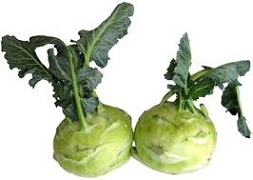
Kohlrabi is a hardy, annual vegetable that is primarily consumed in Germanic countries, although it has also become a vegetable staple in northern India. It is actually a cultivar of cabbage and was specifically bred as a hardier version of cruciferous vegetables, which often can’t grow in as harsh of conditions. The small bulbous vegetable is encased in two harder shells of leaves, which typically do not soften when cooked.
Scientific (Botanical) Name is Brassica oleracea Gongylodes Group
Kohlrabi Nutrition Facts
Kohlrabi is so highly valued in countries and cuisines around the world not only for its diversity in cooking applications, but also because it is full of nutrients and minerals like copper, potassium, manganese, iron, and calcium, as well as vitamins, such as vitamin C, B-complex vitamins, vitamin A, and vitamin K. Along with that, kohlrabi is also high in dietary fiber and antioxidant compounds, such as phytochemicals and various carotenes.
Health Benefits Of Kohlrabi
1. Improves Digestion
2. Helps in Weight Loss
3. Boosts Energy Level
4. Regulates Blood Pressure
5. Prevents Anemia
6. Improves Bone Strength
7. Eye Care
8. Increases your Metabolism
9. Prevents Cancer
Aside from a very rare case of a food allergy, kohlrabi is not the source of any known allergens and can be eaten without worry by the vast majority of people – especially for those looking for a healthier form of cabbage!